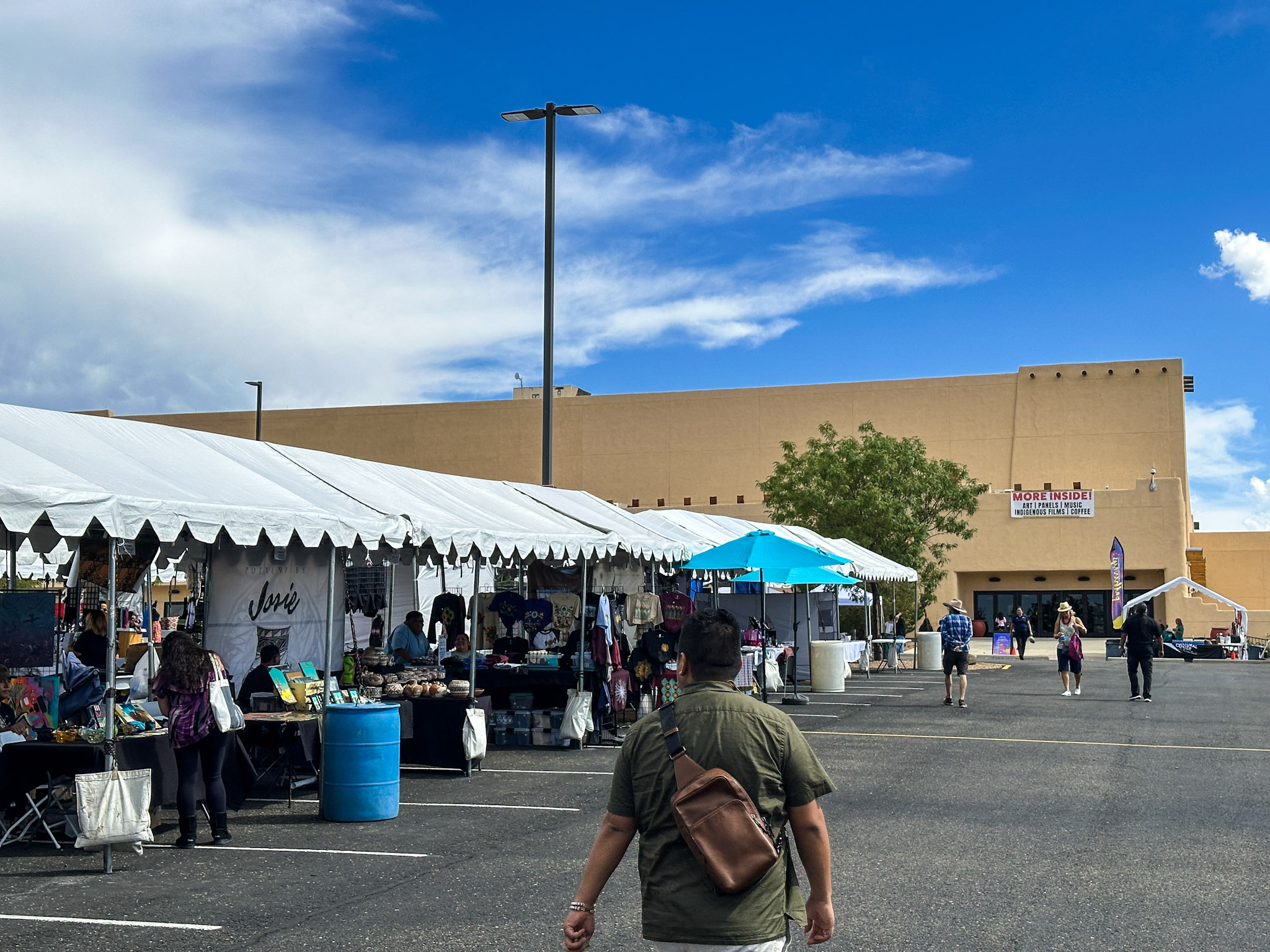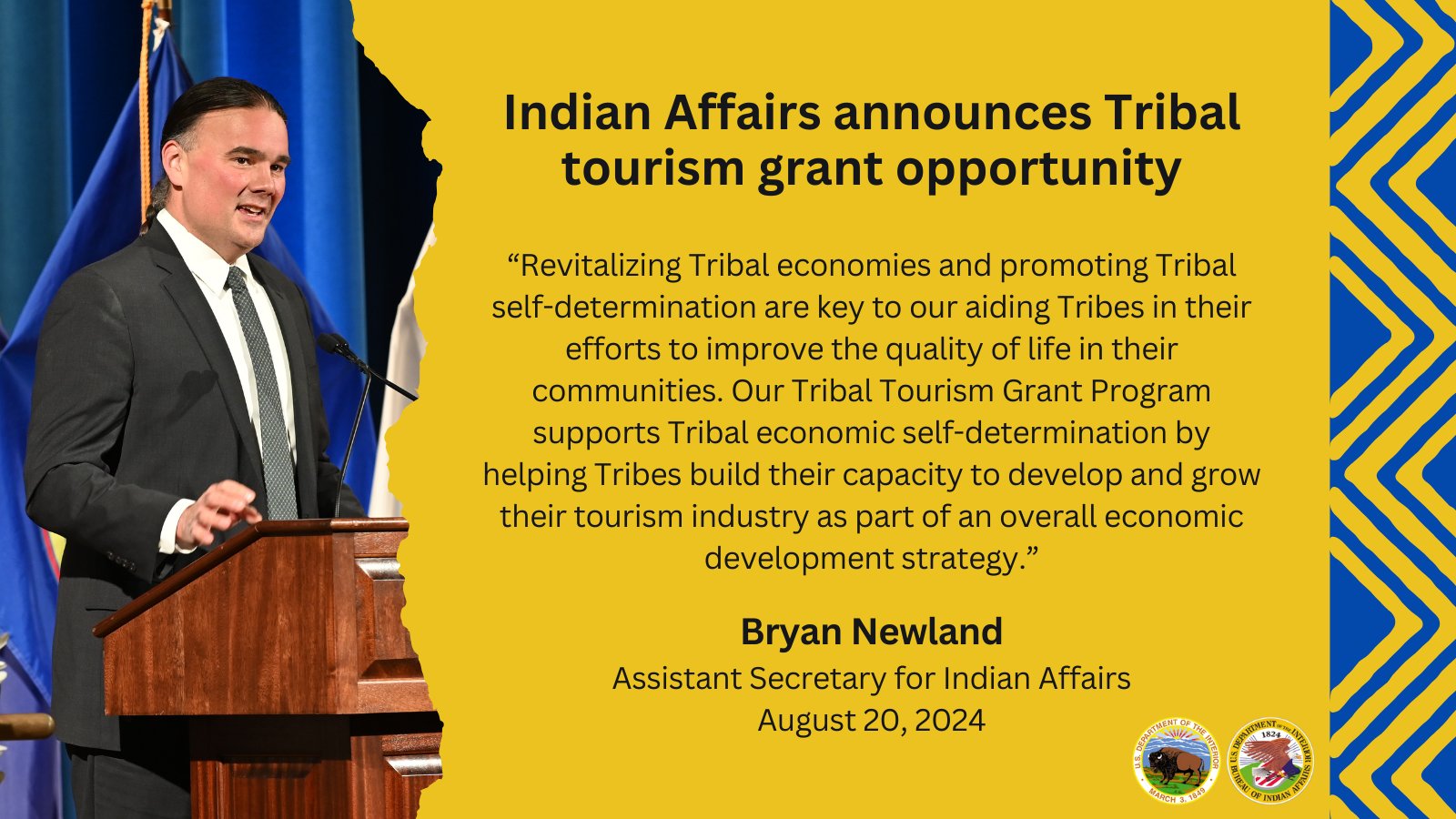Indianz.Com > News > Bureau of Indian Affairs solicits proposals for tourism grants

Bureau of Indian Affairs solicits proposals for tourism grants
Wednesday, August 28, 2024
Indianz.Com
The Bureau of Indian Affairs (BIA) is soliciting proposals for $1.4 million in federal tourism grants.
Under the Tribal Tourism Grant Program, tribes can receive money to plan, develop and manage tourism and related infrastructure in their communities. The money was authorized by Congress through the Native American Tourism and Improving Visitor Experience Act, also known as the NATIVE Act. [S.1579 – 114th Congress]
“Revitalizing Tribal economies and promoting Tribal self-determination are key to our aiding Tribes in their efforts to improve the quality of life in their communities,’ said Assistant Secretary for Indian Affairs Bryan Newland said in an August 20 news release.
“Our Tribal Tourism Grant Program supports Tribal economic self-determination by helping Tribes build their capacity to develop and grow their tourism industry as part of an overall economic development strategy,” said Newland, a political appointee who oversees the BIA, an agency at the Department of the Interior.
Proposals are due by 5pm Eastern on October 25, 2024. More information can be found at bia.gov/service/grants/ttgp
The grants are intended to support building Tribal capacity to plan, develop and manage #tourism and related infrastructure in support of economic development to elevate the living standards of the community. 🪶
— Indian Affairs (@USIndianAffairs) August 20, 2024
Deadline to apply is October 25 at 5 PM ET: https://t.co/f8XGpu3V14
Indian Affairs announces Tribal tourism grant opportunity
The following is the text of an August 20, 2024, news release from the Bureau of Indian Affairs.
WASHINGTON, D.C. — The Indian Affairs Office of Indian Economic Development announced the availability of $1.4 million for the Tribal Tourism Grant Program.
“Revitalizing Tribal economies and promoting Tribal self-determination are key to our aiding Tribes in their efforts to improve the quality of life in their communities,’ said Assistant Secretary for Indian Affairs Bryan Newland. “Our Tribal Tourism Grant Program supports Tribal economic self-determination by helping Tribes build their capacity to develop and grow their tourism industry as part of an overall economic development strategy.”
Indian Affairs expects to select 10 to 15 projects which will receive between $75,000 to $150,000 each over two years. The grants are intended to support building Tribal capacity to plan, develop and manage tourism and related infrastructure in support of economic development to elevate the living standards of the community.
The grants are authorized under the Native American Tourism and Improving Visitor Experience Act, or NATIVE Act.
Proposals must be submitted by 5 p.m. Eastern Time on October 25, 2024. Details on how to apply can be found at https://www.bia.gov/service/grants/ttgp. Questions about this solicitation may be addressed to Mr. Dennis Wilson, OIED-DED Grant Management Specialist, at 505-917-3235 and by e-mail at DEDGrants@bia.gov.

Search
Filed Under
Tags
More Headlines
House Subcommittee on Indian and Insular Affairs meets for oversight hearing
NAFOA: Things You Need to Know this Week (February 24, 2025)
VIDEO: American Indian and Alaska Native Public Witness Hearing Day 3
VIDEO: American Indian and Alaska Native Public Witness Hearing Day 2, Afternoon Session
VIDEO: American Indian and Alaska Native Public Witness Hearing Day 2, Morning Session
VIDEO: American Indian and Alaska Native Public Witness Hearing Day 1, Afternoon Session
VIDEO: American Indian and Alaska Native Public Witness Hearing Day 1, Morning Session
Chuck Hoskin: Cherokee Nation invests in cancer care
Native America Calling: Repatriation is a human rights issue
Indian Country continues fight for funds promised by the U.S. government
Haskell Faculty: Trail of broken treaties continues with mass terminations at tribal college
Georgia Recorder: Judge extends hold on President Trump’s funding freeze
Native America Calling: Traditional Indigenous instruments
Bureau of Indian Affairs turns to new technology to help solve missing and murdered cases
Native America Calling: Tribal broadcasters brace for federal funding fight
More Headlines
NAFOA: Things You Need to Know this Week (February 24, 2025)
VIDEO: American Indian and Alaska Native Public Witness Hearing Day 3
VIDEO: American Indian and Alaska Native Public Witness Hearing Day 2, Afternoon Session
VIDEO: American Indian and Alaska Native Public Witness Hearing Day 2, Morning Session
VIDEO: American Indian and Alaska Native Public Witness Hearing Day 1, Afternoon Session
VIDEO: American Indian and Alaska Native Public Witness Hearing Day 1, Morning Session
Chuck Hoskin: Cherokee Nation invests in cancer care
Native America Calling: Repatriation is a human rights issue
Indian Country continues fight for funds promised by the U.S. government
Haskell Faculty: Trail of broken treaties continues with mass terminations at tribal college
Georgia Recorder: Judge extends hold on President Trump’s funding freeze
Native America Calling: Traditional Indigenous instruments
Bureau of Indian Affairs turns to new technology to help solve missing and murdered cases
Native America Calling: Tribal broadcasters brace for federal funding fight
More Headlines